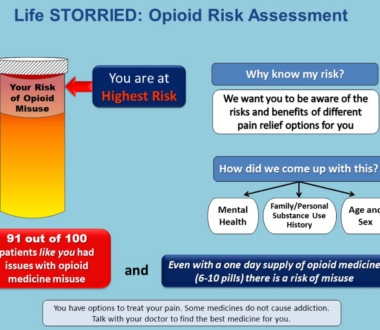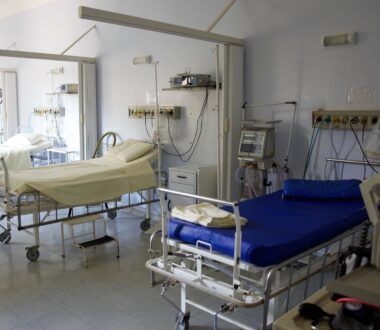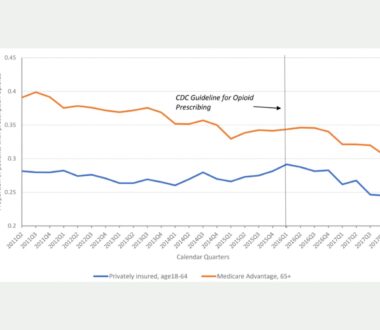
Weighing the Costs and Benefits of Initiating Extended-release Injectable Naltrexone Compared to Buprenorphine-naloxone
Naltrexone and buprenorphine are two effective medications for opioid use disorder (OUD). Naltrexone, which is typically given as a monthly extended-release injection (XR-NTX), and daily oral buprenorphine, which is typically combined with naloxone (BUP-NX), are prescribed in outpatient or office-based medical settings. XR-NTX patients, however, need to complete detoxification before starting treatment. Results from a […]

Patient Preferences Do Not Explain Racial Disparities in Opioid Prescribing
Why are Black patients less likely than white patients to be prescribed opioids for acute pain in the emergency department (ED)? While many theories have been put forward (ranging from racial differences in patients’ pain management preferences to providers’ false beliefs in biological differences between racial groups), the specific mechanisms underpinning these disparities are unclear. […]

Intern Spotlight: Sona Fokum and Weston Lowry
This summer, Sona Fokum and Weston Lowry are interning at the Center for Health Economics of Treatment Interventions for Substance Use Disorder, HCV, and HIV (CHERISH) and expanding their research experience by working alongside CHERISH investigators and colleagues. Both Fokum and Lowry are pursuing careers in healthcare and recognize that this experience will provide foundational […]

Hospitalization as a Reachable Moment for Patients with Opioid Use Disorder
Imagine a medication that reduces morbidity and mortality from a disease that affects more than two million people in the United States. The medication drastically improves quality of life for those who take it and reduces costs to the health care system. For hospitalized patients, this medication decreases the chance of being readmitted and of […]

Pilot Grant Recipients Receive Funding to Examine Health Disparities Related to the Treatment of Substance Use Disorders, HCV, and HIV
Shoshana Aronowitz, PhD, MSHP, FNP-BC Follow Shoshana Aronowitz, PhD, MSHP, FNP-BC, on Twitter @shoshiaronowitz. Shoshana Aronowitz is a family nurse practitioner, community-engaged health services researcher, and assistant professor in the Department of Family and Community Health at the University of Pennsylvania School of Nursing. Her research examines innovative delivery models to promote equitable access to substance […]

Robust Prescription Monitoring Programs and Abrupt Discontinuation of Long-term Opioid Use
Prescription drug monitoring programs (PDMPs) are statewide databases that track controlled substances dispensed at retail pharmacies. Used by health care providers, public health officials, and other stakeholders, PDMPs have become a major tool in addressing unsafe opioid prescriptions. Robust features of PDMPs—including mandates that allow prescriber use of PDMP, data-sharing across states, and prescriber delegation of […]

Prescription Opioids Dispensed to Patients with Cancer with Bone Metastasis: 2011-2017
In the past decade, opioid prescribing in the United States has steadily decreased as federal and state officials implemented strict regulations on prescription opioids to address the opioid crisis. The downward trend sparked concerns of undertreating chronic pain and prompted the Centers for Disease Control and Prevention (CDC) to formally clarify that the 2016 CDC […]

Welcome CHERISH Advisory Board Member Dr. Victoria Behar-Zusman
The Center for Health Economics of Treatment Interventions for Substance Use Disorder, HCV, and HIV (CHERISH) is thrilled to have Dr. Victoria Behar-Zusman joining as a member of the Center Advisory Board. Dr. Behar-Zusman is a principal investigator of the Center for Latino Health Research Opportunities (CLaRO) and leads the Investigator Development Core at the Center for HIV and […]

Hepatitis C Treatment by Non-specialist Providers in the Direct-acting Antiviral Era
Direct-acting antiviral agents (DAAs), highly effective treatments for hepatitis C virus infection (HCV), transformed HCV therapy and made it easier for non-specialist providers to prescribe HCV treatment. Despite this simplification, many insurers include being a specialist as part of prior authorization requirements for DAA treatment. CHERISH Research Affiliate and former pilot grant recipient Shashi N. […]

Prescription Drug Monitoring Program Mandates Affect Use of Opioids to Treat Acute, Severe Pain
Prescription drug monitoring programs (PDMP) have been crucial tools to address unsafe opioid prescribing. High rates of prescribing stoked the flames of the opioid crisis in the early 2000s, but opioid prescriptions have steadily decreased over the past decade. Unfortunately, opioid-related deaths have continued to rise each year. Many states have enacted comprehensive mandates that all clinicians consult the PDMP […]

Economic Evaluations of Pharmacologic Treatment for Opioid Use Disorder: A Systematic Literature Review
In this systematic review, researchers affiliated with the Center for Health Economics of Treatment Interventions for Substance Use Disorder, HCV, and HIV (CHERISH) including CHERISH staff Erica Onuoha and Jared Leff; CHERISH investigators Bruce R. Schackman, Kathryn E. McCollister, and Sean M. Murphy; and CHERISH Advisory Board member Daniel Polsky, identified new studies supporting buprenorphine and methadone as economically advantageous medications for […]

Characterizing Initiation, Use, and Discontinuation of Extended-Release Buprenorphine in a Nationally Representative United States Commercially Insured Cohort
Medications for opioid use disorder (MOUD) are evidence-based treatments that help people reduce or stop using opioids. However, high discontinuation rates of MOUD pose a barrier to reducing opioid-related overdoses. Extended-release buprenorphine (XR-BUP) is a relatively new MOUD, approved in late 2017, that has the potential to increase retention because of its monthly dosing schedule. Currently, there is […]
Engage with CHERISH
Submit a Consultation Request or Contact Us to learn more about how CHERISH can support your research or policy goals.